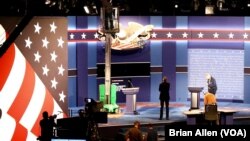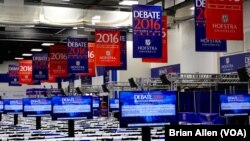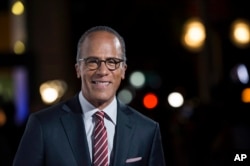Hillary Clinton and Donald Trump are making last-minute preparations for the most anticipated event of the 2016 presidential campaign so far—their first face-to-face debate.
One hundred million people are expected to watch their Monday night showdown at Hofstra University near New York City, which would be the largest audience ever to see a presidential debate.
The two candidates are locked in a tight national contest, with political surveys showing Clinton with a slight edge. This will be the first time Americans will see the two candidates face-to-face on the same stage.
Clinton and Trump already have made their positions clear on many vital issues, including the economy, immigration, the military and terrorism -- so Monday's event may be more about temperament and likability and trustworthiness.
TV viewers and political commentators will be watching both for signs of who appears the more presidential. The slightest body language, smile or grimace, or sign of impatience and exasperation will be analyzed and interpreted.
Monday's debate will be divided into six 15-minute segments. There are three announced topics—America's Direction, Achieving Prosperity and Securing America.
Debate officials said Clinton will get the first question, with two minutes to answer, followed by Trump's two-minute response.
In Photos: Hofstra Hosts 1st Presidential Debate
Different debate styles
Clinton, looking to become the first female U.S. president, is the more seasoned debater, having gone head-to-head against political opponents over the last 16 years, including Obama in the Democratic presidential nominating contest she lost to him in 2008. She is experienced in keeping a tone of moderation under pressure.
Trump, seeking his first elected office, engaged in his initial debate just last year, eventually winning the party's nomination over 16 other Republican presidential contenders, many of them long-time politicians.
Trump has a reputation for being sharp tongued and at times insulting. He has admitted that he regrets some of his more vicious comments. This will be his first one-on-one debate as a political candidate, and he must refrain from wisecracks if he wants to appear presidential and cool.
Chance to repair image
Polls show that U.S. voters hold unfavorable views of both candidates, him a bit more than her.
U.S. political analysts say that leaves Clinton to convince voters she is trustworthy after questions about her truthfulness surrounding her use of an unsecured private email server while she was the country's top diplomat from 2009 to 2013. Investigators concluded that her actions were "extremely careless," but not warranting of criminal charges.
The analysts say the often-fact-challenged Trump has to prove he has a command of U.S. policies and can be trusted to become the next commander-in-chief.
Moderator role
NBC News television anchor Lester Holt is moderating the debate and the way he plays his role could be important as voters judge the candidates.
It is not clear whether Holt plans to point out obvious falsehoods the two candidates might make, as the Clinton campaign wants, or leaves it to the two candidates to rebut something factually wrong the other one says, as Trump wants.
Trump argues that journalists asking questions at the debates should be moderators, not fact-checkers.
"You're debating somebody, and if she makes a mistake or if I make a mistake, we'll take each other on," he said.
Clinton campaign manager Robby Mook told NBC, "We don't want Donald Trump's lies, distortions to be a distraction." He said if Clinton is forced to rebut any factual errors expressed by Trump, it would leave Clinton with less time to talk about her policy plans.
Mook said he was worried that after the debate, analysts might hand Trump "the most improved award," while Clinton would be judged on "the fine points of policy."
Trump's campaign manager, Kellyanne Conway, said the debate will show the "natural connective tissue he has with the people. I can see that this man is ready for tonight."






